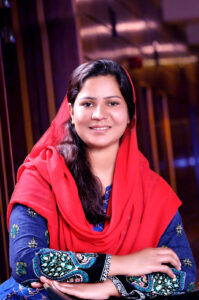At Zeph Center, our mission transcends traditional education. We don’t just provide knowledge; we empower women with diverse skills to help them sustain their families and themselves.
I embarked on this journey at the tender age of thirteen, driven by a burning desire to make a difference. At that time, financial support was nowhere in sight. My mother toiled as a laborer, and my father was bedridden due to a life-altering accident. To keep our free school afloat, I took on a demanding job at the age of 15, working tirelessly eight hours a day, six days a week—an endeavor I persevered with until May 2017.
Since I left that job, I have dedicated ten hours a day to Zeph Center. I’m not just involved in the administrative aspects; I wholeheartedly engage with the girls, becoming their mentor and teacher.
My love for these young girls knows no bounds. As I watch them play freely within our center, their joyful laughter paints a new canvas of life within these walls. In their eyes, I see a profound trust—trust that stems from knowing their spiritual mother is there to ensure their happiness and education.
Even when we must convene for serious meetings, we never interrupt their playtime. Their whims and fancies hold great importance for me. I remember the day I returned from South Korea in July 2017 after completing my Leadership Training at EWHA Women University. The girls called me close and boldly proclaimed, “Sister Zeph, we don’t like our teachers. They want us to study, but we’d rather play all day. Please, remove them from their positions right now.”
Whenever they have disagreements amongst themselves, they come to me with concerns like, “Sister Zeph, my friend is not speaking to me.” I step in, acting as a peacemaker, and within moments, their squabbles are forgotten, and they unite in play once more. I sing, I dance, and I play alongside them.
From dawn till dusk, even in my dreams, I’m constantly crafting plans and envisioning their futures. I cherish capturing every moment of their lives at Zeph Center through photography, especially when they’re engrossed in activities that define their childhood.
Most of these girls are deemed unwanted by society simply because they weren’t born as sons—unwanted children in households longing for a male heir.
Today, I encountered a four-year-old girl. She sat silently, clutching a tattered book. As I aimed to take her photograph, she attempted a pose to conceal her torn pants, threadbare shirt, and unbearable attire for the scorching summer day. Her fragile appearance struck a chord. I asked her, “Why do you look so sad, my child? Are you hungry? Have you eaten anything?” Her answer was heartbreaking: “No.”
I rushed to my home, fetched some food, and she devoured it voraciously. Now, hunger no longer gnawed at her tiny frame.
But when I retreated to the solitude of my rooftop and sat in a quiet corner, tears streamed down my cheeks. I could feel the anguish of hunger, for I too had experienced it during the days when my father’s injury left my mother without skills or education to provide for us. I could empathize with that little girl, her hunger, and her discomfort. She held a book, but how could she focus on her studies when her stomach cried out for sustenance, and her attire was unbearable?
In a family of seven sisters and two brothers, where the father struggled as a laborer and had three children from a second marriage, this little girl had been born out of the desire for a son. Consequently, she lacked even the basic necessities—food and clothing—simply because she was a girl.
This heart-wrenching encounter has left me pondering one crucial question: What holds greater importance, food or education? Can she truly immerse herself in her studies while the pangs of hunger persist? How long will girls be subjected to such disparity simply because they were born as girls?
It’s high time parents realized that girls, too, need nourishment and sustenance. Girls, too, get hungry. And it is our duty, our humanitarian obligation, to ensure that their hunger for knowledge is not overshadowed by the pangs of an empty stomach. At Zeph Center, we remain committed to nurturing these young souls, offering them not just education, but also the sustenance and love they deserve.

